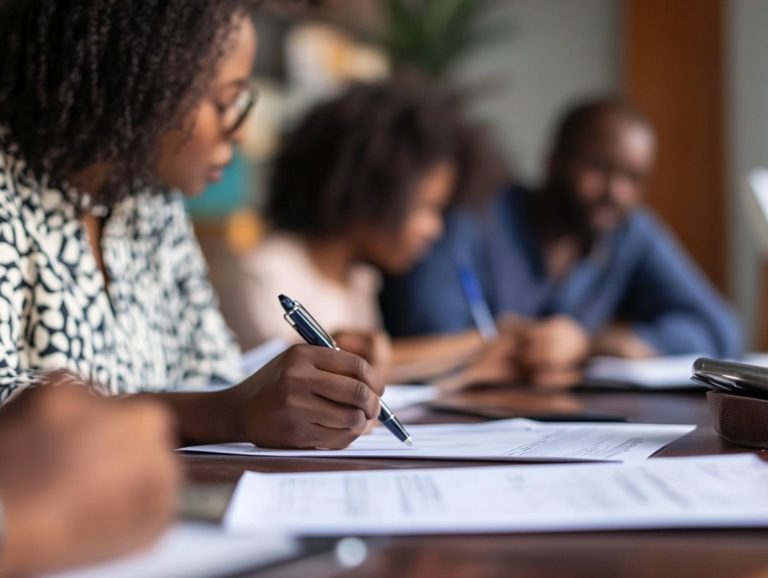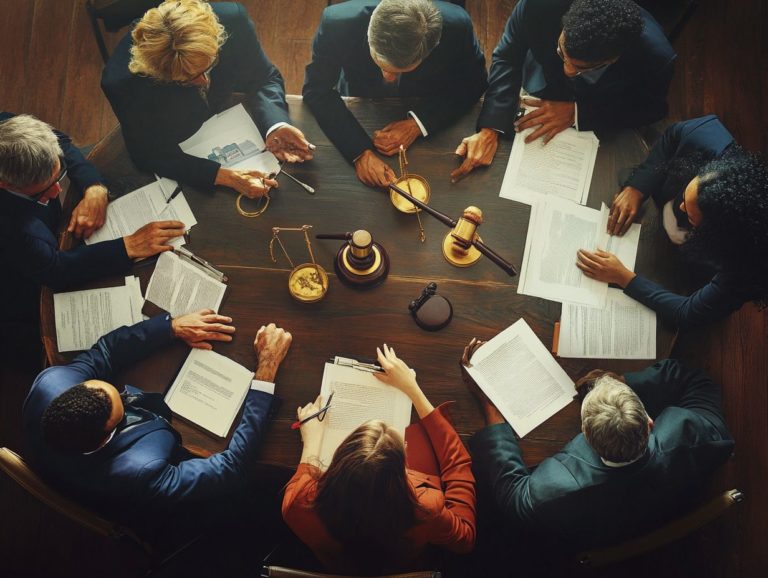The Right to Challenge Evidence in Court
In any legal proceeding, the evidence you present can either solidify your case or lead to its unraveling. Understanding your right to challenge that evidence is essential for ensuring both fairness and justice.
This article delves into what it truly means to challenge evidence, why this practice is significant, and how you can effectively navigate the complexities of the legal system to do so.
From expert testimony to physical evidence, we will explore the common types of evidence that can be contested and the potential outcomes of these challenges. Join us as we unpack the fundamental principles that protect your rights in court.
Contents
- Key Takeaways:
- Understanding the Right to Challenge Evidence
- Why is the Right to Challenge Evidence Important?
- How to Challenge Evidence in Court
- Legal Procedures and Strategies
- Common Types of Evidence Challenged
- Expert Testimony
- Physical Evidence
- Witness Testimony
- Possible Outcomes of Challenging Evidence
- Frequently Asked Questions
- What exactly is the right to challenge evidence in court?
- Who has the right to challenge evidence in court?
- What are some common reasons for challenging evidence in court?
- How can a party challenge evidence in court?
- What happens if evidence is successfully challenged in court?
- Is the right to challenge evidence in court absolute?
Key Takeaways:
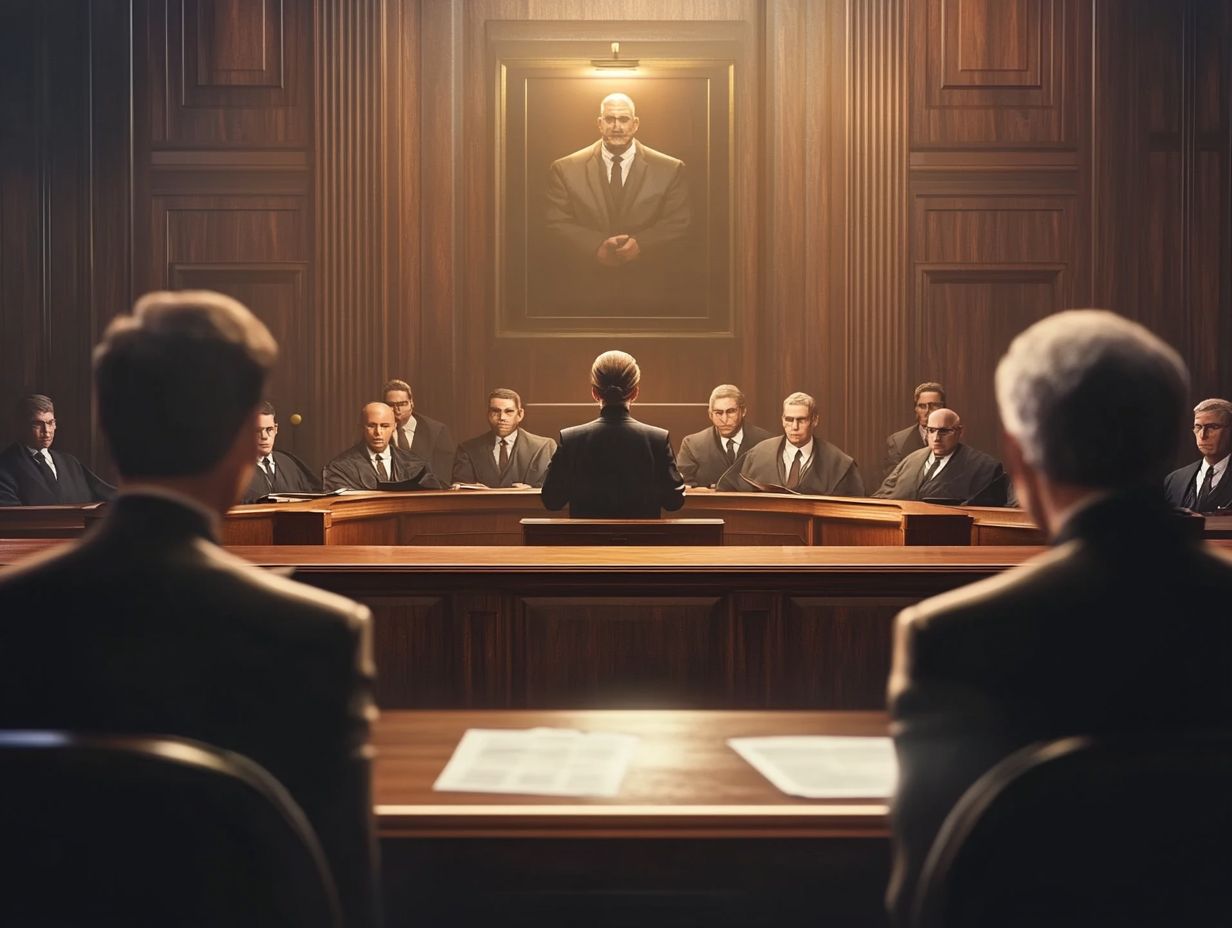
- The right to challenge evidence allows individuals to contest the validity and admissibility of evidence presented in court.
- This right is crucial in ensuring fairness and justice in the legal system.
- Strategies for challenging evidence include questioning witnesses, challenging expert testimony, and examining physical evidence.
- Successfully challenging evidence can lead to dismissal or reduction of charges, ultimately impacting the outcome of a verdict.
Understanding the Right to Challenge Evidence
Understanding your right to challenge evidence in a criminal trial is essential for both the prosecution and the defense. This is especially true in states like Arizona, where legal proceedings follow stringent guidelines.
This right enables you to examine all presented evidence for its authenticity and relevance. Ultimately, this influences the trial’s outcome.
Whether you’re questioning the process that tracks evidence from the crime scene to the courtroom or raising relevance objections, your ability to challenge evidence is vital for ensuring a fair and just legal process.
Defense attorneys are instrumental in this, advocating fiercely for your legal rights throughout courtroom proceedings.
What is the Right to Challenge Evidence?
The right to challenge evidence serves as a crucial legal safeguard, enabling you to contest the admissibility of evidence presented against you during a criminal trial. This fundamental principle not only upholds the integrity of the judicial process but also ensures that your legal rights are respected.
By allowing you to question the validity of the evidence, this mechanism reinforces the concept of due process. It facilitates a fair evaluation in the courtroom.
You may have grounds for challenges, such as claims of improper collection, potential bias, or violations of your constitutional rights, including protection against unreasonable searches and seizures.
The standards for admissibility, typically governed by rules of evidence, play a pivotal role in determining the success of such challenges. They ensure that only reliable and relevant information impacts the outcome of trials.
Why is the Right to Challenge Evidence Important?
The right to challenge evidence is essential for ensuring fairness and justice in the legal process. It allows you to examine the integrity of the evidence presented against you.
This right stands as a cornerstone of the criminal justice system. It reinforces the principle of presumption of innocence until proven guilty beyond a reasonable doubt.
Without the ability to effectively challenge evidence, the outcome of a trial could be unjust. This risks wrongful convictions or acquittals.
By protecting your rights, the legal system demonstrates its commitment to delivering equitable justice.
Preserving Fairness and Justice
Preserving fairness and justice in a criminal trial largely depends on your ability to effectively challenge the evidence presented by the prosecution. This essential right enables you, as a defense attorney, to examine the integrity and admissibility of that evidence.
By ensuring that only legally obtained, relevant, and reliable information sways the jury’s decision, you can impact the trial’s outcome.
Employing various methods, such as filing pre-trial motions to suppress evidence or conducting thorough cross-examinations, is crucial to this endeavor.
You can use strategies like bringing in expert witnesses to challenge the evidence or leveraging established legal precedents that illuminate constitutional violations.
By actively disputing the prosecution’s claims, you not only safeguard the rights of the accused but also reinforce the foundational principles of due process and the guarantees of a fair trial.
Don t hesitate to reach out to a legal expert to explore your rights!
How to Challenge Evidence in Court
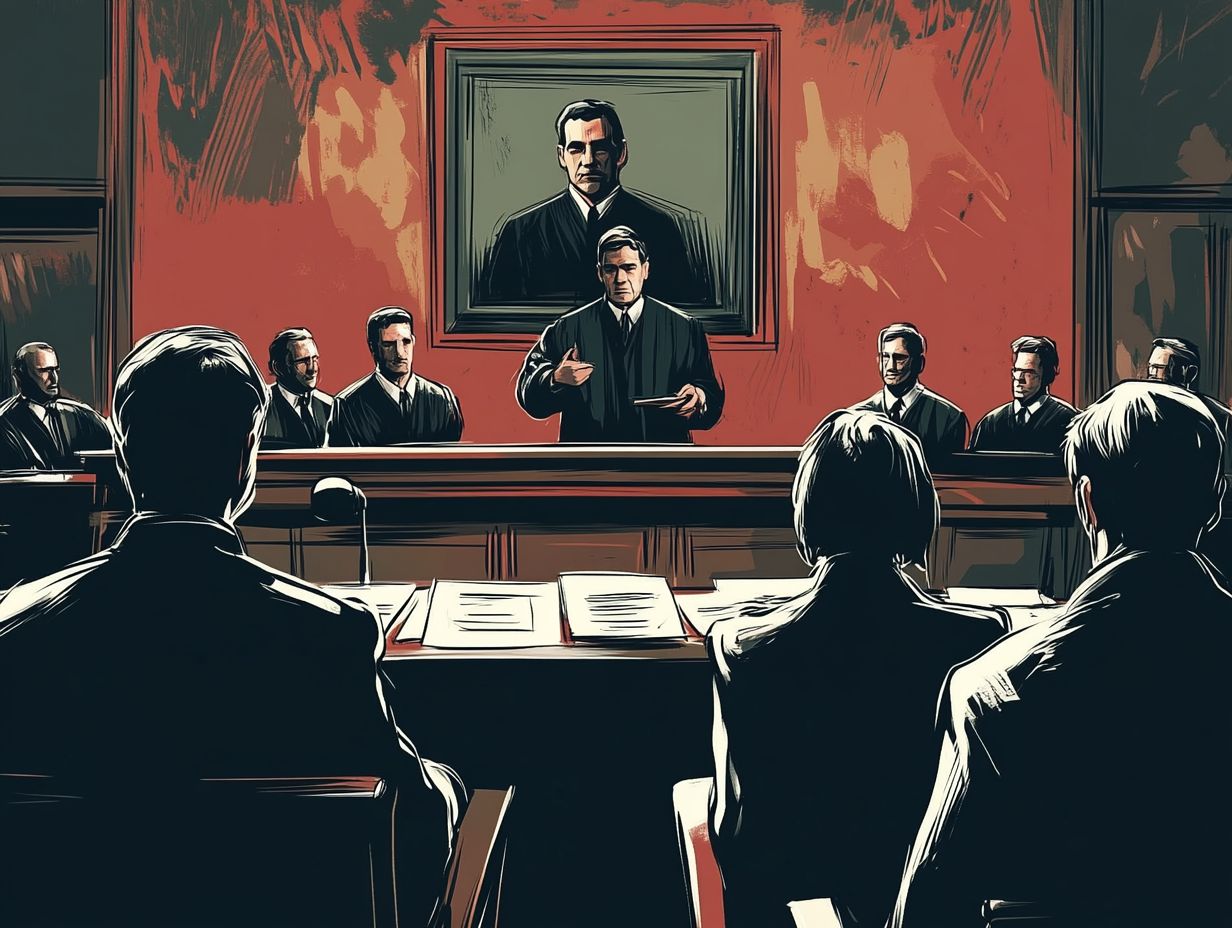
Challenging evidence in court involves navigating complex legal procedures. As a defense attorney, you must skillfully maneuver through these challenges to protect your clients’ rights.
Legal Procedures and Strategies
Legal procedures for challenging evidence generally entail filing motions to suppress or questioning the evidence s validity during trial. You can employ various strategies to effectively challenge the admissibility of evidence, particularly through formal motions such as a motion to suppress or a motion in limine.
A motion to suppress is designed to exclude evidence obtained through illegal searches or violations of constitutional rights. This can significantly influence how jurors perceive the case.
Consider a motion in limine, which proactively prevents potentially prejudicial evidence from reaching the jury. This ensures the trial remains centered on relevant facts.
Throughout this process, you ll utilize courtroom terminology like “hearsay” (information received from others that cannot be substantiated) or “chain of custody” to express objections clearly. This underscores the importance of proper evidence handling and judicial procedure.
This layered approach strengthens your argument and enhances your overall strategy in safeguarding your client’s rights.
Common Types of Evidence Challenged
In criminal trials, you ll often encounter a variety of evidence that faces scrutiny, such as expert testimony, physical evidence, and witness accounts. Each type can profoundly influence the outcome of the trial.
Expert Testimony
Expert testimony, often drawn from seasoned witnesses, plays a pivotal role in criminal trials. These witnesses help clarify intricate scientific concepts for jurors who might not possess a technical background.
Their insights can shape the jury’s grasp of crucial elements in a case, such as the reliability of DNA analysis or ballistic reports. However, the credibility of these experts can come under scrutiny during cross-examination.
During cross-examination, opposing counsel may probe their qualifications, potential biases, or methodologies. The integrity of forensic evidence is critical for a strong case, as it can bolster or undermine the arguments of the prosecution or defense.
Physical Evidence
Challenging physical evidence requires meticulous scrutiny of the chain of custody. You must ensure that the evidence has been properly handled and is admissible in court.
This process is paramount; any break in this chain raises questions about the integrity and reliability of the evidence presented. Take cases involving fingerprints or ballistic evidence it’s crucial to know who collected, transported, and stored that evidence at every stage.
If such careful tracking is neglected, crucial evidence could be deemed inadmissible, potentially jeopardizing your case. Consider a scenario where a weapon is discovered at a crime scene; without thorough documentation of who handled it, its value as evidence diminishes considerably.
Witness Testimony
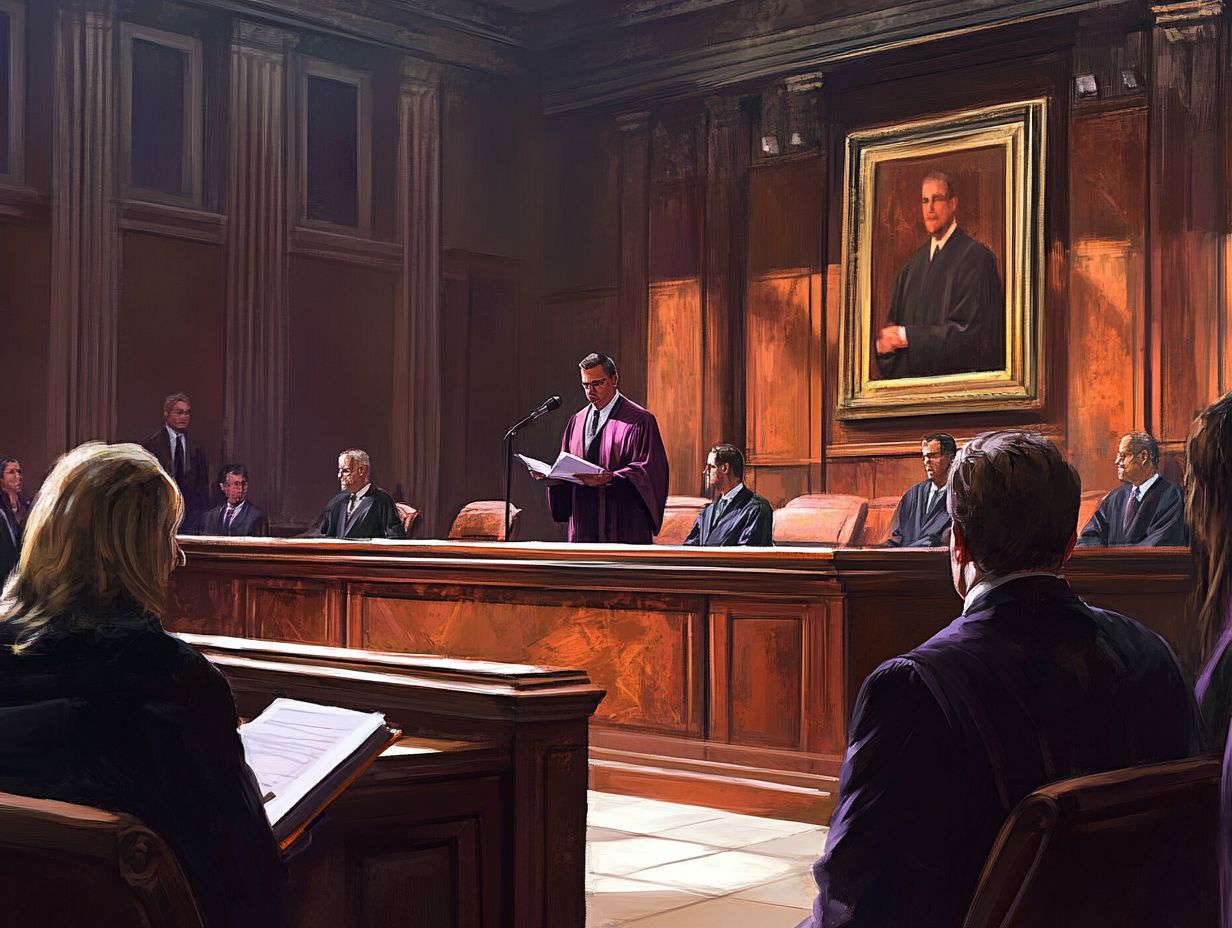
Witness testimony can be challenged on various grounds, especially when assessing the credibility of the witness and the reliability of their statements. As a legal professional, you often utilize cross-examination techniques to dissect their statements.
By posing pointed questions that reveal discrepancies in their accounts, you can effectively weaken the reliability of their testimony. You’ll evaluate factors like the witness’s background, motives for testifying, and past experiences to determine credibility.
Consider a witness with a questionable character; such individuals may face intensified scrutiny, significantly affecting how their statements are viewed in court. Ultimately, your objective is to ascertain whether the witness’s testimony possesses enough reliability to sway the case’s outcome.
In conclusion, challenging evidence is crucial for a fair trial and can dramatically impact the outcome. Engage with this content further to enhance your understanding of these vital legal strategies.
Possible Outcomes of Challenging Evidence
Challenging evidence in court can lead to various outcomes, from the dismissal of charges to a potential reduction of those charges. Such challenges can profoundly influence the final verdict, shaping the trajectory of the case in ways that may not be immediately apparent.
Dismissal of Charges
One possible outcome of successfully challenging evidence is the dismissal of charges. This is particularly true when the prosecution fails to meet the obligation to prove the case.
In these scenarios, you may find relief when crucial evidence is not allowed in court, relying on the legal standards that dictate how evidence should be collected and presented.
For example, in certain criminal cases where evidence was illegally obtained such as coerced confessions or flawed search warrants defense teams have successfully argued for dismissals.
Imagine the relief when charges are dismissed, lifting that heavy weight off your shoulders! A striking instance involves a defendant whose surveillance footage was ruled not allowed in court due to improper protocols during its collection.
Such dismissals highlight the essential checks and balances within the justice system, ensuring that evidence is both reliable and gathered lawfully.
Reduction of Charges
Challenging evidence can sometimes reduce charges, often resulting in more lenient penalties for you as the defendant. When your legal team successfully disputes the legitimacy or admissibility of crucial evidence, it can dramatically alter the course of your case.
For instance, if a vital piece of evidence, like a confession or eyewitness testimony, is ruled not allowed in court due to improper handling or violations of rights, the prosecution may find it difficult to maintain their original charges.
Consider a noteworthy case where a defendant faced accusations of armed robbery. After effectively challenging the reliability of surveillance footage, the charges were reduced from a felony to a misdemeanor. This scenario underscores the legal principle that evidence must be both credible and collected lawfully.
Such outcomes can lessen the severity of potential sentences and have a lasting impact on your future opportunities.
Impact on Verdict
The impact of challenging evidence on a verdict can be truly profound, as it has the power to instill reasonable doubt in jurors minds. When you present credible challenges to the prosecution s case, jurors are likely to reassess the evidence put before them, leading to significant shifts in their perceptions.
Consider the O.J. Simpson trial, where defense attorneys effectively questioned the reliability of DNA evidence. This tactic played a crucial role in swaying jurors toward acquittal. Similarly, the Casey Anthony case showcased how doubts surrounding the integrity of key forensic evidence contributed to the jury’s uncertainty, ultimately resulting in a not guilty verdict.
These instances illustrate that when evidence is rigorously challenged, it can fundamentally reshape jurors’ interpretations and decisions.
Frequently Asked Questions
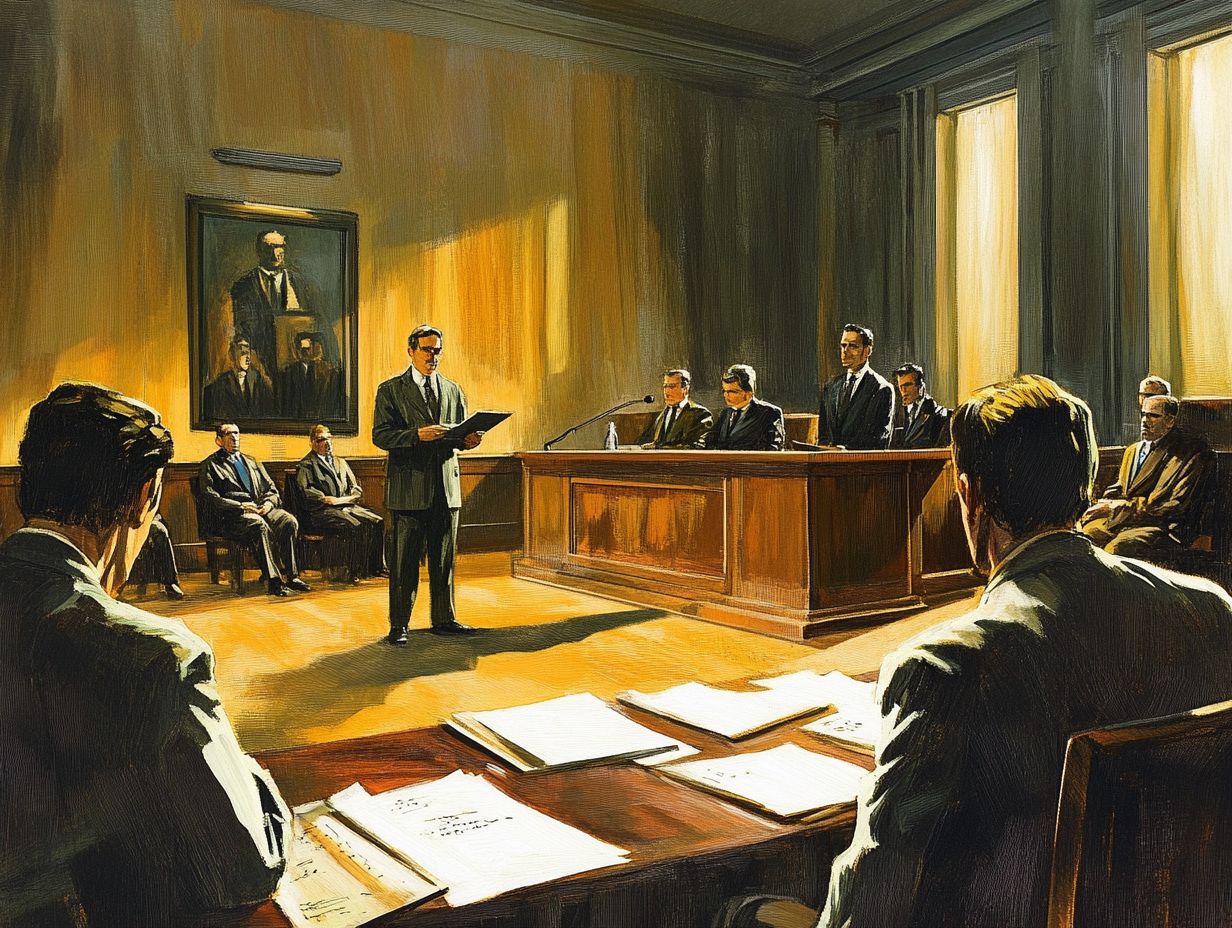
What exactly is the right to challenge evidence in court?
The right to challenge evidence in court is a legal right that allows a party in a legal case to object to the introduction of certain evidence that they believe is not reliable or relevant to the case. This important right ensures fairness and due process in the legal system.
Who has the right to challenge evidence in court?
Both the prosecution and the defense have the right to challenge evidence in court. In criminal cases, the prosecution carries the burden of proving the defendant’s guilt beyond a reasonable doubt, and the defense has the right to challenge any evidence that may weaken the prosecution’s case.
What are some common reasons for challenging evidence in court?
Common reasons for challenging evidence in court include lack of relevance, lack of reliability, violation of the defendant’s constitutional rights, and failure to follow proper procedures in obtaining or handling the evidence.
How can a party challenge evidence in court?
A party can challenge evidence in court by filing a motion to exclude it. This motion should clearly explain why the evidence should be challenged and provide legal support for the argument. The judge will then review the motion and decide whether to allow or exclude the evidence.
If you have questions about challenging evidence, consider seeking legal advice for more information.
What happens if evidence is successfully challenged in court?
If evidence is challenged successfully, it gets excluded from the trial. This means it cannot be used in the case.
This can either weaken the prosecution’s case or strengthen the defense’s case. It all depends on who challenged the evidence.
Is the right to challenge evidence in court absolute?
You can’t always challenge evidence in court. There are specific rules that decide if it can be questioned.
The court looks at how relevant and trustworthy the evidence is. They also listen to the legal points made before deciding to accept or reject it.
Some types of evidence can still be accepted, even if one party challenges them.


